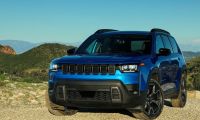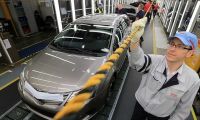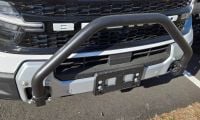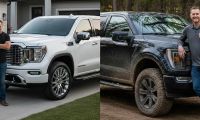This is mostly just my opinion of course, but fewer full size EV pickups is actually a good thing! I am sure however, that people who really want a fully electric ½ - 1 ton EV pickup would beg to differ. A full size pickup needs a lot more batteries, about two to three times as many actually, as subcompact - midsize vehicles. They also do more damage to roads (due to weight) and of course are more likely to severely injure or kill those they might collide with (especially pedestrians). What we need to focus on are plug-in hybrid (PHEV) and hybrid (HEV) full size pickups until battery supply or technology advances to the point where every other light duty passenger vehicle are not constrained by battery availability and more energy dense batteries are available to power these energy hungry full size pickups. Full size PHEV pickups, if plugged in routinely and as long as they have enough range to accommodate a majority of daily miles on electricity alone, are nearly as clean as EV pickups would be in most applications, emissions wise. Smaller compact and mid-size EV pickups could also tow nearly as much as full size pickups and using less battery resources while still providing improved cabin space (due to the lack of an engine up front) and the other performance benefits EVs naturally have over gas powered equivalents (more torque, quieter, able to power equipment without tailpipe emissions, etc.).
The more full size EV pickups we produce, ultimately, the fewer EVs of other types and classes we will be able to make in the near term. It will ultimately slow EV adoption over the next several years if fewer EVs are available and their average price, which is around $69,000 for the top ten selling models from last year, stays as high as it currently is (full size pickups being more expensive, of course). Even though EV prices may have trended downward and are coming closer to equalizing with gas powered equivalents in recent months, all the major EV makers are predominantly preparing to bring larger, more expensive models to market. For every Chevy Blazer and Hyundai Ioniq 6 coming to market, there are larger and more expensive models like the Chevy Silverado, Ram Revolution, EV9 and Ioniq 7 EVs that will push up the average price and reduce the volume of batteries available for smaller and less expensive models.
But American manufacturers still intend to proceed with making large volumes of full size EV pickups, no matter what people like me say. Tesla is planning to finally put its Cybertruck on sale later this year though in small numbers until next year when they intend to ramp up production. Ford is intending to triple the production of their F-150 Lightning EV pickup this year and claims to be on track to achieve their target run rate of 150,000 by the end of the year, despite a February 4th stoppage due to concerns over a battery fire. Undoubtedly Ford and other makers will grow EV pickup production (barring catastrophic challenges), but they will face headwinds around the supply of batteries and other components which are effectively cost limited by the Inflation Reduction Act (IRA). The IRA requires domestic assembly and sourcing of components for EVs to be eligible for federal subsidies. Practically speaking, it raises final costs based on whether manufacturers can source enough components domestically or from a handful of countries with free trade agreements with the US. EV makers producing their vehicles in the US and retaining eligibility for US federal subsidies are going to be constrained by the availability of all components needed to produce their EV pickups (and other vehicles) and will either have to accept fewer sales due to a higher effective price to the consumer, or eat those costs in the name of remaining cost competitive.
What do you think, readers? Are full size EV pickups a poor application of our limited battery supplies? Should we be focusing our limited battery supplies on smaller vehicles and use PHEV and HEV platforms for the largest light duty vehicles for the time being? Please leave your questions and comments below.
Images courtesy of Ford and Chevrolet.
Justin Hart has owned and driven electric vehicles for over 15 years, including a first generation Nissan LEAF, second generation Chevy Volt, Tesla Model 3, an electric bicycle and most recently a Kia Sorento PHEV. He is also an avid SUP rider, poet, photographer and wine lover. He enjoys taking long EV and PHEV road trips to beautiful and serene places with the people he loves. Follow Justin on Twitter for daily KIA EV news coverage.
Set Torque News as Preferred Source on Google











